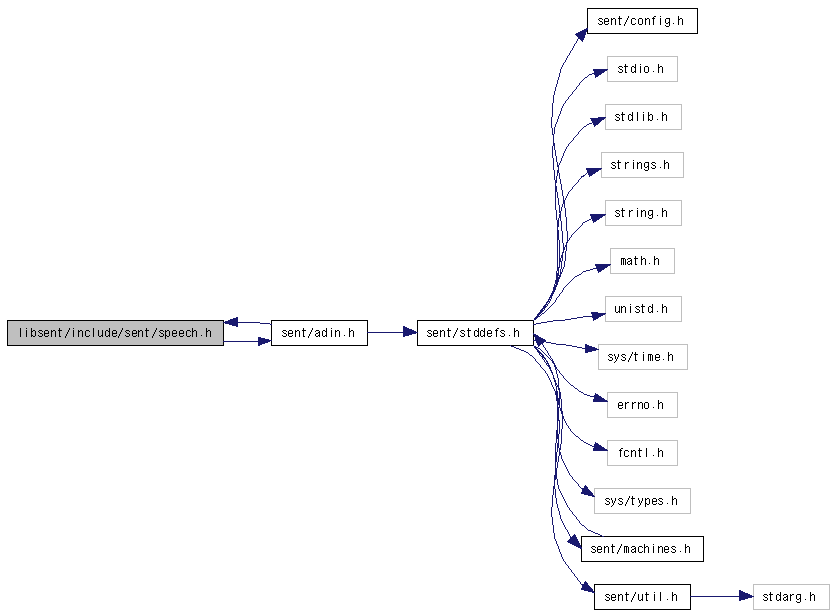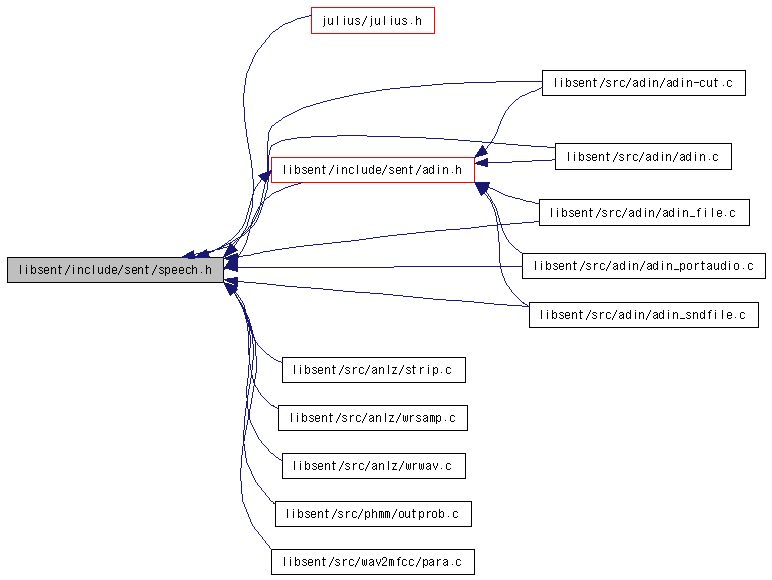
#include <sent/adin.h>
speech.hのインクルード依存関係図

このグラフは、どのファイルから直接、間接的にインクルードされているかを示しています。

マクロ定義 | |
| #define | MAXSEQNUM 150 |
| Maximum number of words in an input. | |
| #define | MAXSPEECHLEN 320000 |
| Maximum length of an input in samples | |
| #define | INPUT_DELAY_SEC 8 |
| Maximum length of input delay in seconds | |
| #define | OUTPROB_CACHE_PERIOD 100 |
| Expansion period in frames for output probability cache | |
| #define | period2freq(A) (10000000.0 / (float)(A)) |
| Macro to convert smpPeriod (100nsec unit) to frequency (Hz) | |
| #define | freq2period(A) (10000000.0 / (float)(A)) |
| Macro to convert sampling frequency (Hz) to smpPeriod (100nsec unit) | |
関数 | |
| int | wrsamp (int fd, SP16 *buf, int len) |
| FILE * | wrwav_open (char *filename, int sfreq) |
| Open/create a WAVE file and write header. | |
| boolean | wrwav_data (FILE *fp, SP16 *buf, int len) |
| boolean | wrwav_close (FILE *fp) |
| Close the file. | |
| int | strip_zero (SP16 a[], int len) |
入力ソースに関する定義は adin.h,MFCC 特徴量抽出に関する定義は mfcc.h, 特徴量パラメータについては htk_param.h を参照して下さい.
speech.h で定義されています。
| #define MAXSEQNUM 150 |
Maximum number of words in an input.
This value defines limitation of word length in one utterance input. If the number of words exceeds this value, Julius produces error. So you have to set large value enough.
参照元 bt_current_max()・cpy_node()・print_1pass_result()・wb_init().
| #define MAXSPEECHLEN 320000 |
Maximum length of an input in samples
This value defines limitation of speech input length in one utterance input. If the length of an input exceeds this value, Julius stop the input at that point and recognize it, disgarding the rest until the end of speech (long silence) comes.
The default value is 320000, which means you can give Julius an input of at most 20 secons in 16kHz sampling. Setting smaller value saves memory usage.
参照元 adin_cut()・adin_cut_callback_store_buffer()・adin_store_buffer()・adin_thread_create()・adin_thread_process()・RealTimeInit().
| #define INPUT_DELAY_SEC 8 |
Maximum length of input delay in seconds
This value defines maximum delay on live speech recognition with slow machines. If an input delays over this sample, the overflowed samples will be dropped. This value is used on callback-based ad-in, namely on portaudio interface.
The default value is 8 seconds. Setting smaller value saves memory usage but risk of overflow grows on slow machines
参照元 adin_mic_standby().
| #define OUTPROB_CACHE_PERIOD 100 |
Expansion period in frames for output probability cache
When recognition, the 1st recognition pass stores all the output probabilities of HMM states for every incoming input frame, to speed up the re-computation of acoustic likelihoods in the 2nd pass. In live input mode, this output probability cache will be re-allocated dynamically as the input becomes longer.
This value specifies the re-allocation period in frames. The probability cache are will be expanded as the input proceeds this frame.
Smaller value may improve memory efficiency, but Too small value may result in the overhead of memory re-allocation and slow down the recognition.
参照元 outprob_cache_init().
| int wrsamp | ( | int | fd, | |
| SP16 * | buf, | |||
| int | len | |||
| ) |
| FILE* wrwav_open | ( | char * | filename, | |
| int | sfreq | |||
| ) |
Open/create a WAVE file and write header.
Open or creat a new WAV file and prepare for later data writing. The frame length written here is dummy, and will be overwritten when closed by wrwav_close().
| filename | [in] file name | |
| sfreq | [in] sampling frequency of the data you are going to write |
参照元 record_sample_open().
Write speech samples.
| fp | [in] file descriptor | |
| buf | [in] speech data to be written | |
| len | [in] length of above |
| boolean wrwav_close | ( | FILE * | fp | ) |
Close the file.
The frame length in the header part is overwritten by the actual value before file close.
| fp | [in] file pointer to close, previously opened by wrwav_open(). |
| int strip_zero | ( | SP16 | a[], | |
| int | len | |||
| ) |
Strip zero samples from speech data.
| a | [I/O] speech data | |
| len | [in] length of above |
参照元 adin_cut().
 1.5.0
1.5.0